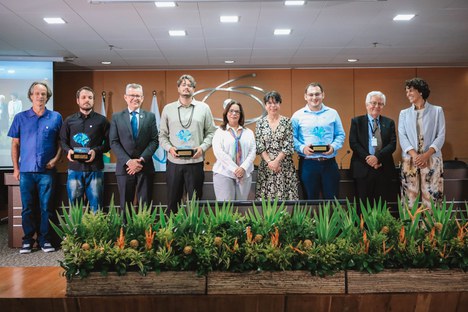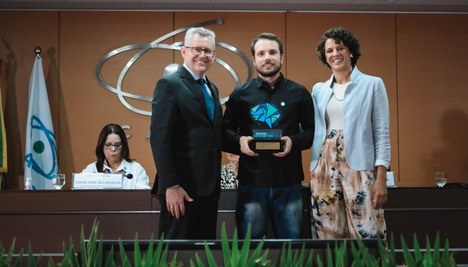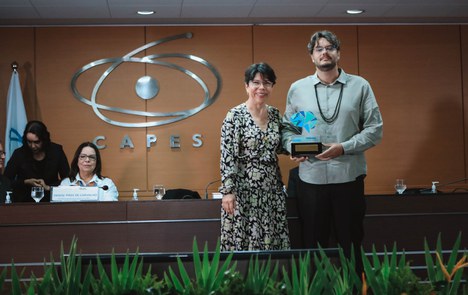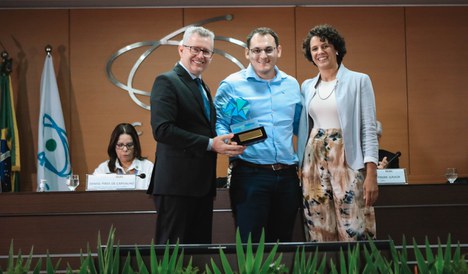- Photo: Grand prizes were distributed on stage (Niara Demarco – CGCOM/CAPES)
During the 2023 CAPES Thesis Prize, on Thursday the 14th, which honored 49 doctors who developed the best theses in Brazil, three of them stood out. They received the CAPES Dissertation Grand Prize, which is awarded to the best selected works in the three groups of the main assessment areas: Engineering, Exact Sciences, Earth Sciences, Interdisciplinary (Exact, Technological and Interdisciplinary Sciences), Biological Sciences, Health Sciences, Agricultural Sciences (Life Sciences), Humanities and Linguistics Literature, Arts and Applied Social Sciences (Humanities).
By celebrating the work of scientists, “we are pointing out how their products impact society, culture and the environment of the country,” emphasized Mercedes Bustamante, President of CAPES. “This award honors excellence among high achievers,” added Denise Carvalho, Minister of Higher Education at the Ministry of Education. Of the three selected for the grand prize, two were considered on Indigenous themes.
- Photo: Giuliano Franco de Moraes (Nayara Demarco – CGCOM/CAPES)
For Juliano Franco de Moraes, from the University of São Paulo, winner of the Grand Prix Viridiana Victoria Rossetti, in the Life Sciences category, this moment reflects an appreciation for indigenous culture, after a turbulent period that put ethnic groups at risk. Because of conflicts over their lands. Through his thesis “The Influence of Indigenous Socio-Cultural Aspects on the Structure, Diversity and Composition of the Amazon Forest,” he demonstrated the importance of indigenous culture and language in promoting and protecting the biodiversity of biomes around the world, especially the Amazon region.
From the field of humanities, another big winner came, which investigated the knowledge of traditional peoples. With his work “Weaving Technology: An Ethnoarchaeology of the Weaving Diversity of the Mapuera People,” Igor Moraes Rodrigues, also from the University of the South Pacific, won the María José García Werribe Grand Prize. For him, his research proves that “the persistence of things will not always be in the physical durability of materials, but in the importance of people’s lives.” He explains that this honor also honors the memory of Renato Borisiwi Wai, one of the people who encouraged him on his journey.
- Photo: Igor Moraes Rodriguez (Nayara DeMarco – CGCOM/CAPES)
In the field of exact, technological and interdisciplinary sciences, Sergio Luiz Novi Junior, from the State University of Campinas (Unicamp), won the Luiz Pinguili Rosa Prize. His research represents an advance in physics applied to medicine, by improving a non-invasive technique that allows brain activity to be measured continuously in an individual. For him, the award “opens doors and makes the curriculum stronger.” Recently, the researcher completed a post-doctoral study in Canada where he obtained technology developed for use in coma patients.
Theses in the fields of exact, technological, interdisciplinary and life sciences were awarded by the Serrapilheira Institute and recognized work in the humanities was awarded by CAPES. Each winner receives a scholarship for postdoctoral training abroad, and the Foundation awards R$9,000 to supervisors to participate in an international conference.
- Photo: Sergio Luiz Novi Jr. (Nayara Demarco – CGCOM/CAPES)
Topics Dissertation Award:
For 17 years, CAPES has received the CAPES Thesis Award and the CAPES Grand Thesis Award, recognizing distinguished researchers in their fields. This year, women won 25 of the 49 districts.
In the selection, the requirements of originality, relevance to scientific, technological and socio-cultural development and innovation, and the quality and quantity of publications resulting from the thesis are taken into account. In addition, the methodology used, quality of writing, and structure/organization of the text are also included in the criteria.
In 2023, the CAPES Dissertation Prize awarded 1,469 dissertations, the largest number of entrants of all editions, from 201 higher education institutions. Of these, 49 were awarded awards and 98 received honorable mentions.
You can watch the entire awards ceremony on the channel CAPS on YouTube
(The Coordination of Personnel Improvement in Higher Education (CAPES) is a body linked to the Ministry of Education (MEC).
(Brasilia – CGCOM/CAPES Editorial)
Reproduction of news is permitted as long as it contains the CGCOM/CAPES signature

“Wannabe internet buff. Future teen idol. Hardcore zombie guru. Gamer. Avid creator. Entrepreneur. Bacon ninja.”





